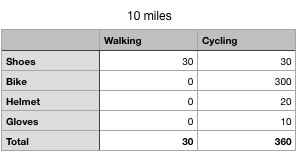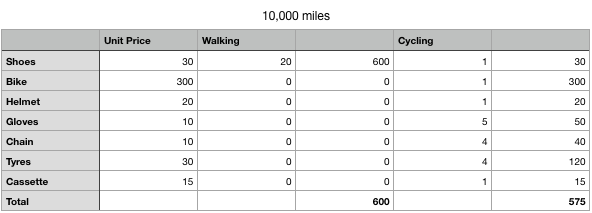Cycling is cheaper than walking.
I asked a few people what they think is cheaper, walking or cycling, and everyone answered that walking is cheaper. It seems logical, because to walk, all you need is shoes, while to cycle, you still need shoes, but you also need a bike and arguably a helmet and gloves.
There's a wide range of prices for both shoes and bikes, and it's up to everyone to decide how much they want to spend on each, but to make this a fair comparison I will use lower midrange UK prices in my calculation.
One pair of shoes is obviously cheaper than a pair of shoes, a bike, a helmet and a pair of gloves, so if you are comparing the cost of going 10 miles, walking is definitely cheaper:

However, at 10,000 miles, the numbers look very different:

The cost of walking 10,000 miles is 20 times higher, while the cost of cycling didn't even double. Already after 10,000 miles, the bike has payed for itself and is saving you money, even compared to walking.
I know that there are other components that you will need to replace, such as brake pads and cables, but these could last 10,000 miles depending on your riding conditions, and even if they don't, they are so cheap that they will barely make a difference to final cost. I also didn't include the cost of labour and the tools needed to perform the maintenance. Most maintenance tasks are easy enough that you can perform them yourself and the tools needed are generally pretty cheap. Again, it wouldn't make much difference to the final cost.
Now, there are a few things that would make a huge difference to the calculation. If you put a price on the time spent traveling, cycling is several times more cost efficient than walking. However, over short distances, you might find yourself spending all the time you saved, by going faster, on parking and locking your bike. Theft and accidents, can completely ruin the numbers for cycling, but you can also get mugged or have an accident, while walking, so it's not completely one sided. I left these things out, because they are too situational and hard to predict.
Cycling is also more energy efficient, but I don't think most people would notice any difference in their food consumption, so I don't think it's worth trying to estimate how much money that would save.
I think my calculation is fair and even if my estimates are a bit off, I think it's quite clear that, given a long enough distance, cycling is cheaper than walking. Any feedback is welcome and I really don't mind to be proven wrong.


